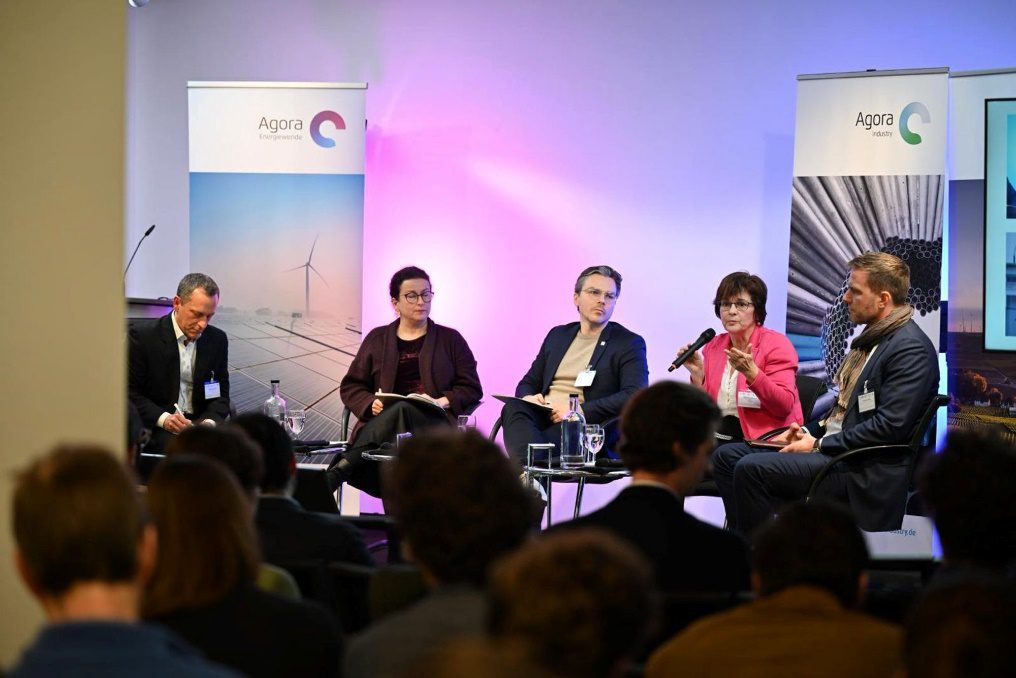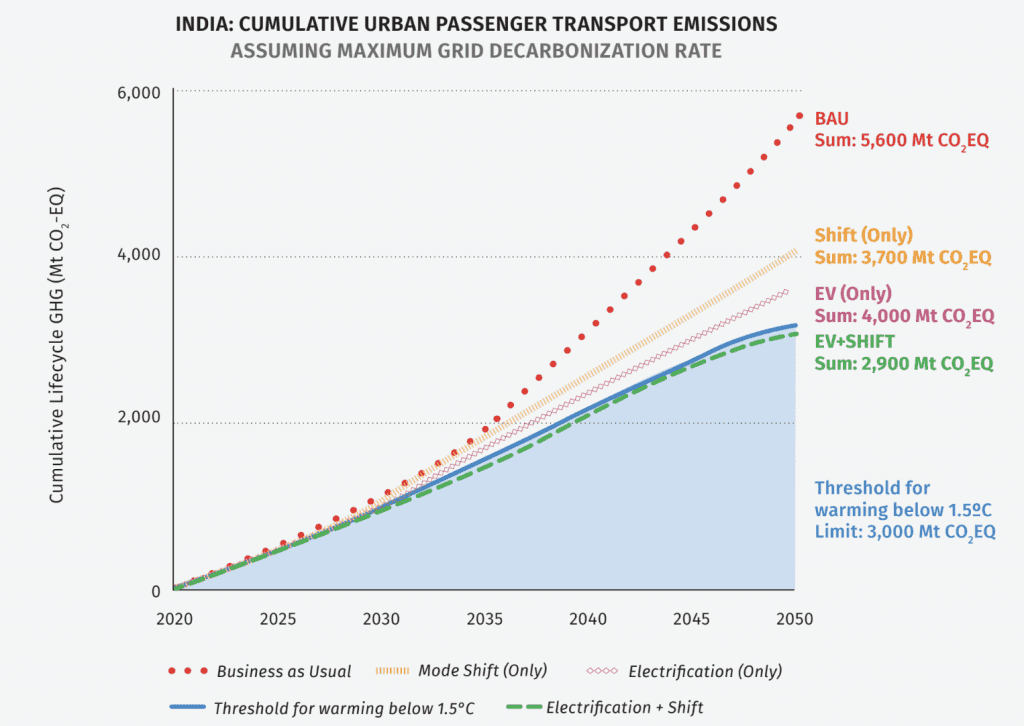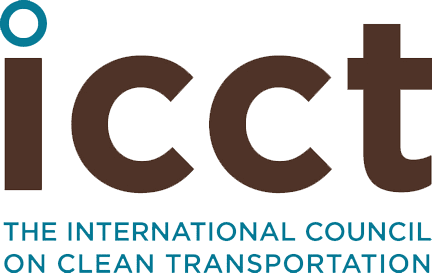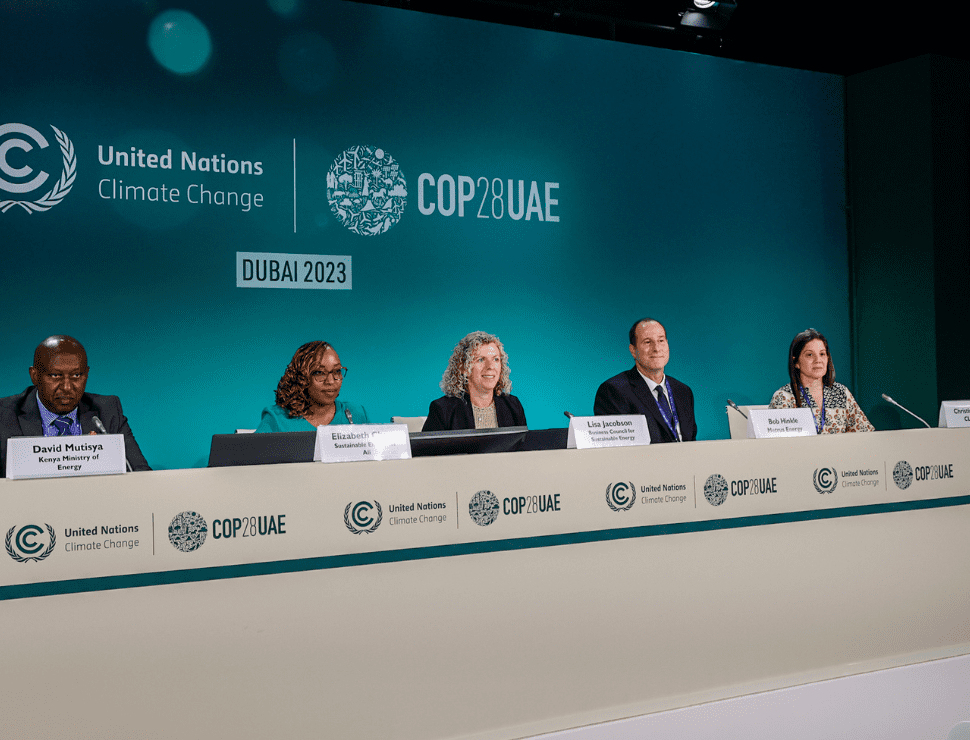
The road ahead for Europe: Policy priorities to accelerate the transition to net zero
The European elections are just around the corner, and will be followed by the appointment of new political leadership at the European Commission. To inform the next phase of European climate policymaking, the Agora Think Tanks launched the report EU Policies for Climate Neutrality in the Decisive Decade at an event in Brussels in January. The paper recommends 20 policy initiatives across different sectors that can help Europe achieve a target of 90 percent greenhouse gas emissions reductions by 2040, while strengthening solidarity, sovereignty, and competitiveness. The launch event included thematic workshops and was a resounding success, with active engagement from policymakers and their staff.
Strengthening Europe’s role in clean-tech value chains, creating lead markets for clean products and technologies, and supporting the electrification of industrial process heat should be among the priorities in the next EU policy cycle, in Agora’s view. Fostering public support for climate policies requires that clean heating, mobility, and dietary options be accessible and affordable. Agora also proposes using the EU’s flagship digital policy to tackle misinformation and disinformation about the climate crisis and to publicize available solutions to ensure people have accurate information at hand. This timely report demonstrates how—in these critical next few years—Europe can lead the way to climate neutrality for the world.


China set to unlock EV smart charging potential through rate reforms
In January, China launched a policy directive to quicken EV integration into the power grid. Its leading economic planning body issued key steps to achieving smart EV charging by refining current time-of-use (ToU) rates. By 2025, all EV charging rates in China will be subject to ToU pricing. Further initiatives will incentivize consumer charging habits that better align with grid needs—ultimately unlocking the beneficial flexibility potential of EVs on the grid. RAP played a crucial role in shaping the ToU rate trajectory in China. RAP’s recent publications in Chinese national media provided concrete ways to refine ToU pricing to support smart charging. Managed, or smart, charging is a crucial mechanism for fostering greater renewable energy integration into China’s energy mix and reducing consumer costs. In contrast, unmanaged charging increases demand for additional thermal plants and creates grid inefficiencies.

Victory for just transition in Poland
As noted in the November bulletin, last year Forum Energii supported Polish workers affected by the closure of coal-fired power plants and lignite mines in their efforts to obtain aid. And great news—the European Commission approved the aid package. This is an important step toward a truly just transition. Eastern Poland, which is already affected by the phaseout of lignite, will be the first to benefit from this program and hopefully will pave the way for other regions. For the first time in Poland, a broad consensus, from trade unions to NGOs, emerged around this cause. Forum Energii was grateful for the opportunity to contribute to the collective effort, and to connect the region with EU decision-makers.

The case for compact city planning and electrification in India
Reducing greenhouse gas emissions from transport is crucial to meet India’s climate action commitments and limit global warming to 1.5°C. Cleaning India’s transportation sector is especially urgent amid recurring hazardous air quality crises in major cities like Delhi and Mumbai. A new report by ITDP and the University of California, Davis, “Compact Cities Electrified: India,” finds developing compact and dense cities that shift most trips to walking, cycling, and public transport while simultaneously pursuing rapid electrification of all vehicles is the solution. Adopting these combined strategies could cut energy demand by one-third and save the Indian government more than $1 trillion over the next 30 years. The research shows that neither strategy on its own is capable of reducing emissions to a level compatible with limiting future global warming to 1.5°C. Rather, it is the combination of the two that will ensure India meets its Paris Agreement commitments and achieves its net zero goals by 2070.


Charging up China’s transition to electric vehicles
China is a global leader in the adoption of electric vehicles, but insufficient charging access remains a major challenge. In a new report, ICCT researchers examine the number, coverage, capacity, and utilization of public chargers in China and offer recommendations for the country to expand and improve its charging infrastructure. The report finds that China’s public charger infrastructure network is the largest in the world, with more than 1 million chargers—51 percent of the global total—and a total power capacity of 56 gigawatts as of 2022. Public chargers in China are disproportionately concentrated in developed cities, however, with the top 15 cities accounting for 57 percent of the country’s total public charger stock. To expand and improve its public charging infrastructure network, China could consider adopting new metrics to assess charger deployment and usage, developing localized charger deployment plans based on data-driven charging needs assessments, targeting low-coverage areas for new planning and investment, and improving the quality and comprehensiveness of charger data through an official national database.

Indonesian cities agree on action plans for sustainable city development
Mayoral representatives from two growing cities in Indonesia have agreed to create action plans for low-carbon buildings. Based on GBPN’s data analysis and recommendations, the plans will implement low-carbon building practices that promote energy efficiency. Both city leaders from Tangerang Selatan and Balikpapan expressed support for integrating building decarbonization efforts into the long-term city development planning. Tangerang Selatan City Mayor Benyamin Davnie said, “I am fully supporting GBPN and the government agencies involved in this initiative. Carbon reduction and energy conservation, particularly through the adoption of low-carbon emission buildings, is one of the core pillars in realizing the Tangerang Selatan sustainable vision. How to make this process simple, easy to understand and interesting for the public is the key to active involvement. By fostering a sense of ownership and collective responsibility, we are laying the foundation for lasting change.” GBPN Indonesia Country Manager Dr Ery Wijaya, said the project was a great example of GBPN’s bottom-up approach.


Global climate agreement sets stage for greater appliance ambition
COP28 marked a pivotal moment in advancing climate solutions. For the first time, a global goal of doubling energy efficiency was included in the final agreement. This historic result is the culmination of extensive efforts by CLASP and other efficiency advocacy groups. Seven CLASP team members, including CEO Christine Egan, attended COP28 and contributed to this momentum on the ground in Dubai. They participated in more than 15 events alongside key partners and policymakers, highlighting the messages of CLASP’s landmark publication Net Zero Heroes: Scaling Efficient Appliances for Climate Change Mitigation, Adaptation & Resilience, which identifies 10 appliances crucial for promoting climate mitigation, adaptation, and resilience. CLASP’s members inspired important discourse, emphasizing the potential of appliance efficiency as a low-cost and highly effective mitigation solution. CLASP also hosted three side events, addressing issues such as curbing appliance dumping and the role of cities in climate mitigation. One of these events, an official UN side event, was held in collaboration with Climate Action Network and emphasized the urgent need for efficient appliance solutions in a just energy transition. Throughout COP28, CLASP and partners championed energy efficiency as a critical climate solution, and it finally earned its due recognition, marking a pivotal moment for the global climate agenda.

Events around the Alliance
The future of public transport: conclusions and best practices from the field
Over the last year, ITDP’s Mobilize Learning Lab convened experts to discuss the question, “What is the future of public transport?” and to assess the implications for urban equity, resiliency, and funding sustainability. In this webinar, ITDP brought researchers from the program and representatives from three cities—Dar es Salaam, Bhubaneswar, and Rio de Janeiro—to discuss how the intersection of research and practice helps us find a way forward for developing equitable, well-funded, and resilient public transport systems for all.
European industrial sovereignty and competitiveness in the Green Deal
Europe needs to reinforce its industrial resilience and competitiveness in a changing global context. It also faces the huge task of implementing the Green Deal in industrial sectors and setting climate targets for 2040. An event hosted by Agora Industry on March 5 will bring together European industry leaders and policymakers to discuss the important synergies between these goals and priorities to align them more effectively.

